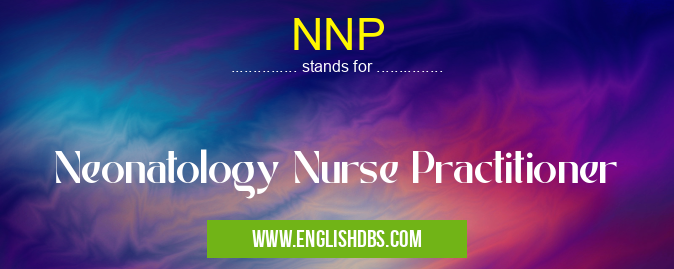What does NNP mean in NURSING
NNP stands for Neonatology Nurse Practitioner. They are advanced practice registered nurses (APRNs) who specialize in the care of newborns, infants, and children up to 28 days old. NNPs provide comprehensive care for a wide range of conditions, including premature birth, respiratory distress syndrome, and congenital heart defects.

NNP meaning in Nursing in Medical
NNP mostly used in an acronym Nursing in Category Medical that means Neonatology Nurse Practitioner
Shorthand: NNP,
Full Form: Neonatology Nurse Practitioner
For more information of "Neonatology Nurse Practitioner", see the section below.
What does NNP Stand for
- N: Neonatology
- N: Nurse
- P: Practitioner
Roles and Responsibilities of NNPs
NNPs perform a variety of tasks, including:
- Providing comprehensive care: NNPs assess, diagnose, and treat newborns and infants. They also provide preventative care, such as immunizations and health screenings.
- Collaborative care: NNPs work closely with other healthcare professionals, such as pediatricians, neonatologists, and respiratory therapists, to provide optimal care for their patients.
- Education and support: NNPs provide education and support to parents and families on a variety of topics, such as breastfeeding, newborn care, and infant development.
Education and Training
To become an NNP, individuals must complete a master's or doctoral degree program in nursing. These programs typically include coursework in neonatology, pharmacology, and research. After completing their education, NNPs must pass a national certification exam to practice.
Essential Questions and Answers on Neonatology Nurse Practitioner in "MEDICAL»NURSING"
What is the scope of practice for a Neonatology Nurse Practitioner (NNP)?
NNPs provide comprehensive care to critically ill newborns in the hospital setting. They perform physical exams, order and interpret diagnostic tests, prescribe medications, and provide respiratory and nutritional support. They also work closely with families to provide education and support.
What is the education and training required to become an NNP?
NNPs must have a master's degree in nursing with a specialty in neonatology. They must also pass a national certification exam administered by the National Certification Corporation for the Obstetric, Gynecologic, and Neonatal Nursing Specialties (NCC).
What are the career opportunities for NNPs?
NNPs work in a variety of settings, including neonatal intensive care units (NICUs), newborn nurseries, and pediatric clinics. They may also work as educators or researchers. NNPs have a high earning potential and are in high demand.
What are the challenges faced by NNPs?
NNPs work with critically ill newborns who require complex and intensive care. They must be able to make quick and critical decisions in high-stress situations. NNPs also face challenges related to the emotional toll of caring for sick infants and their families.
What are the rewards of being an NNP?
NNPs have the opportunity to make a significant difference in the lives of newborns and their families. They are highly respected for their expertise and dedication. NNPs also enjoy a high level of job satisfaction and career fulfillment.
Final Words: NNPs play a vital role in the healthcare of newborns and infants. They provide comprehensive care, collaborate with other healthcare professionals, and educate parents and families. NNPs are highly skilled and knowledgeable nurses who are dedicated to providing the best possible care for their patients.
NNP also stands for: |
|
| All stands for NNP |
